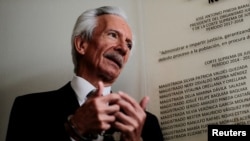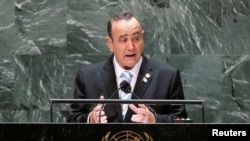“I keep my passport handy in case I have to leave in a hurry,” the Guatemalan journalist said.
The journalist works for an independent media outlet that has published reports critical of Guatemalan President Alejandro Giammattei.
In the months leading up to the general election on June 25, journalists, prosecutors and judges have been arrested in what analysts have seen as a deliberate campaign by the government and its allies to silence critical voices.
“I fear for my own safety. There is an atmosphere of repression in the country now,” the unnamed journalist told VOA by telephone. VOA is withholding the journalist’s location and gender for security reasons.
Part of the concerns come from a verdict handed down in June to Jose Ruben Zamora. A court sentenced the high-profile journalist to six years in prison for money laundering in a case that rights groups branded an attack on free speech.
'Political persecution'
Zamora was the publisher of El Periodico, a media outlet that ran stories critical of successive governments. He and his family have described the case as “political persecution.”
Nancy Calderon from the Guatemala Secretary of Communications, however, said that the government "categorically rejects" claims of interference in the judicial branch. In a message to VOA, she said, "We reiterate respect for the independence of powers, the institutions, and the state."
Carmen Rosa de Leon, who leads the Institute for Sustainable Development, a Guatemalan think tank, said that under the government of the past four years, the military, corrupt officials and criminals have only become more powerful.
“Journalists who have questioned this or reported on corruption scandals have faced reported prosecutions, which are designed to keep them in prison and to stop them from doing their jobs,” she told VOA from Guatemala.
She said almost all journalists who worked for media that had investigated or been critical of the government have gone into exile.
“The freedom of the press has inevitably suffered because there are fewer newspapers or reporters able or allowed to say what is really going on,” she said.
Fighting corruption is a key issue in the June vote, Reuters reported.
But research by media watchdog Reporters Without Borders found that in Guatemala, media that look into official corruption risk “harassment campaigns and criminal prosecution.” It ranked the country 127th out of 180 in its World Press Freedom Index, where 1 shows the best media environment.
“Anyone who touches the subject of corruption or of impunity is not safe," Manfredo Marroquin, director of the watchdog Transparency International in Guatemala, told VOA. "The government and organized crime take revenge on journalists who publish articles about corruption or take action against judges or prosecutors. It is a strategy to eliminate any voice which is against this system of pillage which exists in this country.”
Respect for journalism claimed
Calderon, from the Guatemala Secretary of Communications, told VOA that the government "has respected and promoted the practice of journalism in the country, making multimedia platforms available for journalists to access all government information."
Noting the number of resources and platforms available, she added, "Since the beginning of the present administration, these media have made more than 10,000 publications critical of the presidency," adding that data show "two things have been guaranteed from the executive branch: access to official sources of information and freedom of the press."
VOA also tried to contact journalists who work for media deemed more sympathetic toward the government in Guatemala, but none responded to requests for comment or interview.
Over the past decade, Guatemala has fallen to its lowest ebb on the issue of corruption, according to Transparency International, falling to 150th out of 180 countries.
Giammattei was elected in 2019 on a promise of vowing to tackle corruption. But he did not revive the International Committee Against Impunity in Guatemala, a U.N.-backed anti-corruption body that his predecessor closed.
He also clashed with the U.S. government over efforts to curb graft and his management of the justice system, Reuters reported.
Giammattei is not standing for reelection. Reuters reported that polling has pointed to a close contest between former first lady Sandra Torres, conservative career diplomat Edmond Mulet and Zury Rios. The latter is the daughter of the late dictator Efrain Rios Montt. One of the favorites in the election, businessman Carlos Pineda, was earlier barred from the race over failure to comply with election rules.
Zamora of El Periodico has vowed to clear his name. “I feel happy because in the end [the sentence] was arbitrary,” he told journalists after the June 14 hearing.
'World will be watching'
His case poses a threat to independent and free expression, Brian Nichols, assistant secretary for Western Hemisphere affairs at the U.S. State Department, said on Twitter.
“The world will be watching that his personal safety and health will be protected,” he said.
El Periodico was founded in 1996 and became one of Guatemala’s leading investigative media outlets.
Among the stories it broke was a report about how Russian business figures in 2021 allegedly sent bundles of cash to the Guatemalan president rolled up in a red carpet, a claim the president’s office at the time denied. The story was picked up by international media, including The New York Times.
Zamora was arrested in July last year during a crackdown on journalists, prosecutors, judges, human rights activists and opposition officials, which was led by the country’s Special Prosecutor’s Office Against Impunity, or FECI. And in May, Zamora’s media outlet announced that it would cease working.
Samari Gomez, FECI assistant prosecutor, who was arrested last year in relation to the Zamora case for allegedly disclosing confidential information, was acquitted.
During the case, Zamora’s evidence was not admitted, and he underwent eight changes of defense attorney, some of whom are now facing charges in connection with the case.
Carlos Martinez de la Serna, program director at the U.S.-based Committee to Protect Journalists, said in a statement that the conviction showed the Guatemalan government’s “desperate attempts” to criminalize journalists and called for Zamora to be released.
Some information for this report came from Reuters.





